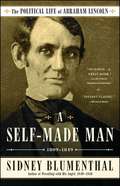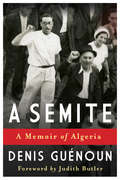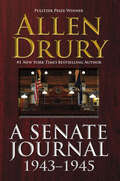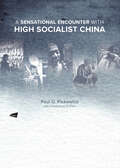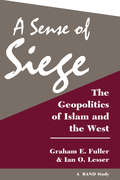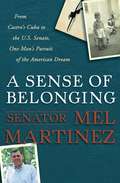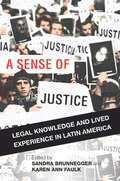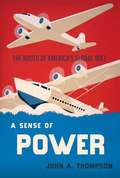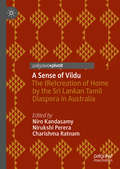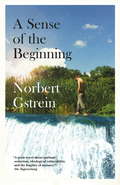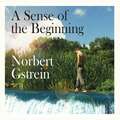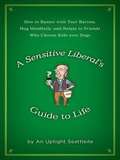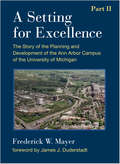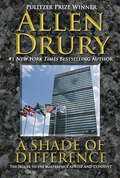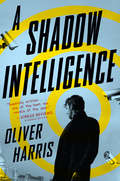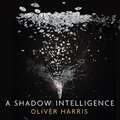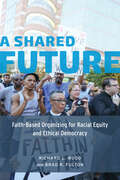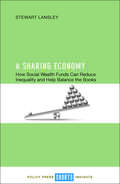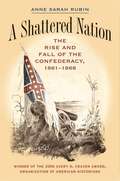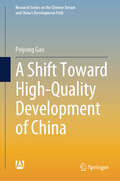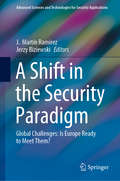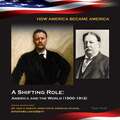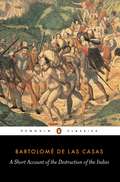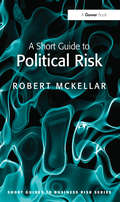- Table View
- List View
A Self-Made Man: The Political Life of Abraham Lincoln Vol. I, 1809–1849 (The Political Life of Abraham Lincoln #1)
by Sidney BlumenthalThe first in a sweeping, multi-volume history of Abraham Lincoln—from his obscure beginnings to his presidency, death, and the overthrow of his post-Civil War plan of reconciliation—&“engaging and informative and…thought-provoking&” (The Christian Science Monitor).From his youth as a voracious newspaper reader, Abraham Lincoln became a free thinker, reading Tom Paine, as well as Shakespeare and the Bible. In the “fascinating” (Booklist, starred review) A Self-Made Man, Sidney Blumenthal reveals how Lincoln’s antislavery thinking began in his childhood in backwoods Kentucky and Indiana. Intensely ambitious, he held political aspirations from his earliest years. Yet he was a socially awkward suitor who had a nervous breakdown over his inability to deal with the opposite sex. His marriage to the upper class Mary Todd was crucial to his social aspirations and his political career. “The Lincoln of Blumenthal’s pen is…a brave progressive facing racist assaults on his religion, ethnicity, and very legitimacy that echo the anti-Obama birther movement….Blumenthal takes the wily pol of Steven Spielberg’s Lincoln and Doris Kearns Goodwin’s Team of Rivals and goes deeper, finding a Vulcan logic and House of Cards ruthlessness” (The Washingtonian). Based on prodigious research of Lincoln’s record, and of the period and its main players, Blumenthal’s robust biography reflects both Lincoln’s time and the struggle that consumes our own political debate. This first volume traces Lincoln from his birth in 1809 through his education in the political arts, rise to the Congress, and fall into the wilderness from which he emerged as the man we recognize as Abraham Lincoln. “Splendid…no one can come away from reading A Self-Made Man…without eagerly anticipating the ensuing volumes.” (Washington Monthly).
A Semite: A Memoir of Algeria
by Denis GuenounIn this vivid memoir, Denis Guénoun excavates his family's past and progressively fills out a portrait of an imposing, enigmatic father. René Guénoun was a teacher and a pioneer, and his secret support for Algerian independence was just one of the many things he did not discuss with his teenaged son. To be Algerian, pro-independence, a French citizen, a Jew, and a Communist were not, to René's mind, dissonant allegiances. He believed Jews and Arabs were bound by an authentic fraternity and could only realize a free future together. René Guénoun called himself a Semite, a word that he felt united Jewish and Arab worlds and best reflected a shared origin. He also believed that Algerians had the same political rights as Frenchmen. Although his Jewish family was rooted in Algeria, he inherited French citizenship and revered the principles of the French Revolution. He taught science in a French lycée in Oran and belonged to the French Communist Party. His steadfast belief in liberty, equality, and fraternity led him into trouble, including prison and exile, yet his failures as an activist never shook his faith in a rational, generous future.René Guénoun was drafted to defend Vichy France's colonies in the Middle East during World War II. At the same time, Vichy barred him and his wife from teaching because they were Jewish. When the British conquered Syria, he was sent home to Oran, and in 1943, after the Allies captured Algeria, he joined the Free French Army and fought in Europe. After the war, both parents did their best to reconcile militant unionism and clandestine party activity with the demands of work and family. The Guénouns had little interest in Israel and considered themselves at home in Algeria; yet because he supported Algerian independence, René Guénoun outraged his French neighbors and was expelled from Algeria by the French paramilitary Organisation Armée Secrète. He spent his final years in Marseille. Gracefully weaving together youthful memories with research into his father's life and times, Denis Guénoun re-creates an Algerian past that proved lovely, intellectually provocative, and dangerous.
A Senate Journal 1943-1945
by Allen DruryThe sequel to the Pulitzer Prize winning bestseller Advise and Consent. From Allen Drury, the 20th Century grand master of political fiction, a novel of the United Nations and the racial friction that could spark a worldwide powderkeg. International tensions rise as ambassadors and politicians scheme, using the independence of a small African nation as the focal point for hidden agendas. A cascade of events begun in the General Assembly Hall of the United Nations could lead to the weakening of the United States, the loss of the Panama Canal, and a possible civil war. Allen Drury paints a vivid and laser-accurate portrait of Washington and international politics, from top secret conferences, to elite cocktail parties, club luncheon rooms, and the private offices of the key players in government. A novel as relevant today as when it was first published.
A Sensational Encounter with High Socialist China
by Paul G. PickowiczA Sensational Encounter with High Socialist China is a recollection of the historic visit of fourteen American students (and one Canadian) to China in 1971. The visit was one of the first approved for American scholars after the Chinese Communist Party came to power in 1949 and occurred prior to President Nixon's famous trip (as well as that of a second group of scholars) in 1972. One of these students, Paul Pickowicz, kept a journal and photographically documented the trip. This book is a personal account of the events leading up to their visa approvals as well as those that occurred during the journey itself. The five senses are used to connect the reader to his experience and are placed in the context of a theatrical production. The images included have been selected from an archive at the University of California, San Diego, which digitized the author's images as well as those of others in the Committee of Concerned Asian Scholars (CCAS) taken during both the 1971 and 1972 delegations.
A Sense Of Siege: The Geopolitics Of Islam And The West (A\rand Corporation Research Study Ser.)
by Graham FullerThis is an exploration of the nature of the friction between the Muslim world and the West, looking at legitimate perceptions and grievances on both sides. Arguing that "Islam versus the West" does not represent the arena of the next global ideological struggle, the authors examine specific issues - for example, the enlarged role of Islam in internal politics - that require careful handling to prevent the consolidation of states into opposing blocs. They suggest that comprehensive reform to break away from authoritarian order is of paramount importance, that political Islam threatens the established order in Muslim countries far more than it threatens the West, and that violent confrontation can best be circumvented by integrating Islamist forces into the political process.
A Sense of Belonging: From Castro's Cuba to the U.S. Senate, One Man's Pursuit of the American Dream
by Mel MartinezThe swift and improbable rise of Mel Martinez to the top echelon of America's government began not with a political race but with a burst of gunfire. In April 1958, an eleven-year-old Martinez huddled on his bedroom floor while Cuban soldiers opened fire on insurgents outside his family's home in the normally sleepy town of Sagua la Grande. With that hail of bullets, the idyllic Cuba of his boyhood was shattered. If political unrest made daily life disturbing and at times frightening, Fidel Castro's Communist Revolution nine months later was nothing short of devastating. Martinez's Catholic school was suddenly shuttered as the Communist regime threw priests out of the country. A sixteen-year-old boy from his town was seized and killed by a firing squad. When armed militiamen shouted violent threats at Martinez for wearing a cloth medallion as a sign of his Catholic faith, his parents made a heartrending decision: their son would have to escape the Castro regime--alone. Under the greatest secrecy, the Martinez family arranged through a special church program to have Mel airlifted out of Cuba to America. After months of painstaking planning (and a simple mistake that nearly scuttled the entire arrangement), fifteen-year-old Martinez stepped on a plane bound for Miami. He had no idea when--or if--he would see his family again.A Sense of Belonging is the riveting account of innocence lost, exile sustained by religious faith, and an immigrant's gritty determination to overcome the barriers of language and culture in his adopted homeland. Martinez warmly recalls a bucolic childhood in Cuba, playing baseball, fishing at the beach, and accompanying his father on veterinary visits to neighboring farms. He also vividly recounts the harrowing changes under Castro that forced him to flee, as well as the arduous years he spent in American refugee camps and foster homes. And he captures the sheer joy of being reunited with his family after four years of wrenching separation. Having embraced life in America, he set about the delicate task of guiding his parents through their struggles with assimilation while also building his own family and career. Through it all, Martinez embodies the ideal of service to others, whether comforting a younger child on the flight from Havana to Miami or giving legal advice pro bono to his father's friends in the Cuban-American community. Though his story ends in the hallowed halls of the U.S. Capitol, Martinez has never forgetten the boy who experienced the loss of liberty under Communism. A Sense of Belonging is a paean to the transformative power of the American Dream.From the Hardcover edition.
A Sense of Justice: Legal Knowledge and Lived Experience in Latin America
by Karen Faulk Sandra BrunneggerThroughout Latin America, the idea of "justice" serves as the ultimate goal and rationale for a wide variety of actions and causes. In the Chilean Atacama Desert, residents have undertaken a prolonged struggle for their right to groundwater. Family members of bombing victims in Buenos Aires demand that the state provide justice for the attack. In Colombia, some victims of political violence have turned to the courts for resolution, while others reject the state's ability to fairly adjudicate their grievances and have constructed a non-state tribunal. In each of these examples, the protagonists seek one main thing: justice. A Sense of Justice ethnographically explores the complex dynamics of justice production across Latin America. The chapters examine (in)justice as it is lived and imagined today and what it means for those who claim and regulate its parameters, including the Brazilian police force, the Permanent Peoples' Tribunal in Colombia, and the Argentine Supreme Court. Inextricable as "justice" is from inequality, violence, crime, and corruption, it emerges through memory, in space, and where ideals meet practical limitations. Ultimately, the authors show how understanding the dynamic processes of constructing justice is essential to creating cooperative rather than oppressive forms of law.
A Sense of Power: The Roots of America's World Role
by John A. ThompsonWhy has the United States assumed so extensive and costly a role in world affairs over the last hundred years? The two most common answers to this question are "because it could" and "because it had to." Neither answer will do, according to this challenging re-assessment of the way that America came to assume its global role. The country's vast economic resources gave it the capacity to exercise great influence abroad, but Americans were long reluctant to meet the costs of wielding that power. Neither the country's safety from foreign attack nor its economic well-being required the achievement of ambitious foreign policy objectives. In A Sense of Power, John A. Thompson takes a long view of America's dramatic rise as a world power, from the late nineteenth century into the post-World War II era. How, and more importantly why, has America come to play such a dominant role in world affairs? There is, he argues, no simple answer. Thompson challenges conventional explanations of America's involvement in World War I and World War II, seeing neither the requirements of national security nor economic interests as determining. He shows how American leaders from Wilson to Truman developed an ever more capacious understanding of the national interest, and why by the 1940s most Americans came to support the price tag, in blood and treasure, attached to strenuous efforts to shape the world. The beliefs and emotions that led them to do so reflected distinctive aspects of U.S. culture, not least the strength of ties to Europe. Consciousness of the nation's unique power fostered feelings of responsibility, entitlement, and aspiration among the people and leaders of the United States. This original analysis challenges some widely held beliefs about the determinants of United States foreign policy and will bring new insight to contemporary debates about whether the nation should--or must--play so active a part in world politics.
A Sense of Viidu: The (Re)creation of Home by the Sri Lankan Tamil Diaspora in Australia
by Niro Kandasamy Nirukshi Perera Charishma RatnamThis book is the first compilation of the experiences of the Sri Lankan Tamil diaspora in Australia. It explores the theme of home—from what is left behind to what is brought or (re)created in a new space—and all the complex processes that ensue as a result of leaving a land defined by conflict. The context of the book is unique since it focuses on the ten-year period since the Sri Lankan civil war ended in 2009. Although the war has officially come to an end, conflict continues in diverse and insidious forms, which we present from the point of view of those who have left Sri Lanka. The multidisciplinary nature of the book means that various aspects of Sri Lankan Tamil experiences are documented including trauma, violence, resettlement, political action, cultural and religious heritage, and intergenerational transmission. This book draws on qualitative methods from the fields of history, geography, sociology, sociolinguistics, psychology and psychiatry. Methodological enquiries range from oral histories and in-depth interviews to ethnography and self-reflexive accounts. To complement these academic chapters, creative contributions by prominent Sri Lankan artists in Australia seek to provide personalised and alternative interpretations on the theme of home. These include works from playwrights, novelists and community arts practitioners who also identify as human rights activists.
A Sense of the Beginning
by Norbert GstreinA poignant novel of political-religious awakening by one of Germany's literary starsAn anonymous phone call, an unattended bag discovered in the station of a small Austrian town, a piece of paper saying, "Repent!" and "Next time it will be for real!" A C.C.T.V. image of a young man. What was it that made the teacher think it was his old student, Daniel?Ten years earlier Daniel had spent time with the teacher in his remote house by the river. The town had talked. Anton had recently returned from two years teaching in Istanbul - he was unsettled, subversive, solitary. Daniel was on the brink of adulthood - idealistic, unrequitedly in love with Judith, vulnerable to influence. Those summer weeks by the river were an idyll. But did they also sow the seeds of Daniel's later obsessiveness, his biblical attitudes, his political dogmatism? As the bomb threat excites the community with all the tension of a witch hunt, and Anton himself becomes a focus for suspicion and gossip, he anatomises his memories of the preceding decade. What went wrong for Daniel, and could he have stopped it?
A Sense of the Beginning
by Norbert GstreinA poignant novel of political-religious awakening by one of Germany's literary starsAn anonymous phone call, an unattended bag discovered in the station of a small Austrian town, a piece of paper saying, "Repent!" and "Next time it will be for real!" A C.C.T.V. image of a young man. What was it that made the teacher think it was his old student, Daniel?Ten years earlier Daniel had spent time with the teacher in his remote house by the river. The town had talked. Anton had recently returned from two years teaching in Istanbul - he was unsettled, subversive, solitary. Daniel was on the brink of adulthood - idealistic, unrequitedly in love with Judith, vulnerable to influence. Those summer weeks by the river were an idyll. But did they also sow the seeds of Daniel's later obsessiveness, his biblical attitudes, his political dogmatism? As the bomb threat excites the community with all the tension of a witch hunt, and Anton himself becomes a focus for suspicion and gossip, he anatomises his memories of the preceding decade. What went wrong for Daniel, and could he have stopped it?
A Sense of the Beginning
by Norbert GstreinA bomb threat is made at a provincial Austrian village station. An unattended bag placed next to three messages: "Repent!", "First and final warning!" and "Next time it will be for real!. But no-one takes it too seriously, not even the police. Then a teacher in the village thinks he recognises his favourite pupil Daniel on a wanted notice in a newspaper. The teacher befriended Daniel when they spent a summer together at his house by the river, but Daniel has been growing increasingly obsessive of late, losing himself in religious and political dogmatism after a trip to Israel. For his teacher, this marks the start of a spiral of introspection and self doubt, reinforced by his inability to feel at home anywhere after spending several years in Istanbul. What's more, he is suddenly swamped by memories of the pivotal moments of his own adolescence, which floor him completely. Was it Daniel's love for Judith and his fascination with an American fire-and-brimstone evangelist who is passing through on his way to Jerusalem or could it have been the complex relationship between the two of them that led the boy astray? Norbert Gstrein examines the crucial decisions we take as we start out in life and the omnipresent reference points of childhood. This is a moving and absorbing story, told by an unparalleled author at the height of his powers. (P)2016 W F Howes Ltd
A Sensitive Liberal's Guide to Life
by The Uptight SeattleiteIn the tradition of The Official Preppy Handbook, The Uptight Seattleite is the Stephen Colbert of left-wing satire The author of the wildly popular Seattle Weekly advice column teaches Americans everywhere how to embrace their inner leftist. Artfully balancing the cosmic with the cosmopolitan, the Uptight Seattleite (aka Adrian) delights his loyal readers each week with snide insight on everything from fashion ("Can I pull off a Rasta beret?") to ear-bud etiquette. In A Sensitive Liberal's Guide to Life, he brings his savvy smugness to his widest audience yet, on topics such as the hierarchy of transportation righteousness (what to do with the clunky old Subaru after purchasing a Prius) and ethical behavior at the grocery store, including how to handle the horror forgetting to bring your reusable burlap sack. Other day-to-day advice covers what to read on the bus (Vonnegut versus The Kite Runner versus The Economist) and feasting at the buffet of diversity, with tips for shooting a condescending smile at those who don't know how to use chopsticks. The Uptight Seattleite also helps readers navigate the big issues, such as responsible parenting (which calls for a mini-landfill kit, perfect for the backyard and ready to be stuffed with environmentally unfriendly diapers). For every insecure liberal-and those who love to make fun of them-the Uptight Seattleite offers us laughs from the pinnacle of political correctness.
A Setting For Excellence, Part II: The Story of the Planning and Development of the Ann Arbor Campus of the University of Michigan
by Frederick W. MayerCampus planning is often a crucial underlying set of goals for university administrations, even if, over time, the mix of new and old buildings, changes in usage patterns and activities of students, and evolution of styles present challenges to a cohesive campus plan. In its two-hundred year history the University of Michigan has planned its campus in waves, from the earliest days of the iconic buildings around the Diag to the plans for the hospitals and the North Campus. This immensely informative and entertaining second volume in the history of the evolution of the campuses offers an absorbing narrative from the perspective of Fred Mayer, who served for more than three decades as the campus planner for the university during an important period of its growth during the late twentieth century. By tracing the development of the Ann Arbor campus from its early days to the present, within the context of the evolution of higher education in America, Mayer provides a strong argument for the importance of rigorous and enlightened campus planning as a critical element of the learning environment of the university. His comprehensive history of campus planning, illustrated with photos, maps, and diagrams from Michigan’s history, is an outstanding contribution to the university’s history as it approaches its bicentennial.
A Shade of Difference
by Allen DruryRacial tensions threaten to sink the US in this sequel to the Pulitzer Prize–winning Advise and Consent from the #1 New York Times–bestselling author. From Allen Drury, the twentieth-century grand master of political fiction, comes a novel of the United Nations and the racial friction that could spark a worldwide powder keg. International tensions rise as ambassadors and politicians scheme, using the independence of a small African nation as the focal point for hidden agendas. A cascade of events begun in the General Assembly Hall of the United Nations could lead to the weakening of the United States, the loss of the Panama Canal, and a possible civil war. Allen Drury paints a vivid and laser-accurate portrait of Washington and international politics, from top secret conferences, to elite cocktail parties, club luncheon rooms, and the private offices of the key players in government. Praise for Allen Drury and A Shade of Difference &“On every page you hear the drums of jeopardy. This is a measure of Mr. Drury&’s mastery. He has a remarkable skill for keeping not only his characters but also his readers in dramatic turmoil. There are hardly any bystanders in his dramatis personae.&” —The New York Times &“The market that found Advise and Consent enormously readable will take this in stride. Here is another contemporary-and beyond-novel dealing with the chitchat as well as the more profound thoughts on issues that are with us—yesterday, today, tomorrow.&” —Kirkus Reviews &“Drury&’s stories are detailed and compelling portraits of the machinery of government as relevant today as when they were first published.&” —HuffPost
A Shadow Intelligence (An Elliot Kane Thriller)
by Oliver HarrisThere is a dark side to MI6 that needs men like Elliot Kane—volatile, inquisitive, free-floating—in the field. They take them and put two years and over £100k into their training, showing them how to steal cars, strip weapons, and hack bank accounts. There are courses on the use of blackmail and improvised explosives, and entire workshops solely dedicated to navigating by the stars. But no one tells them how to go home. Kane has spent fifteen years managing events overseas that never make the papers. He is a ghost in his own life, assuming and shedding personalities as each new cover story comes into play. But when the woman he loves, another operative named Joanna Lake, vanishes without a trace in Kazakhstan, he is forced center stage in his own life. Drawn ever deeper into a realm of deception and conflicting agendas, Kane moves from merely infiltrating events to steering them. While he's well-versed in modern psychological warfare, snowbound Kazakhstan presents unique challenges—poised between China, Russia, and the West, dictatorship and democracy, state intelligence and an increasingly powerful world of private agencies, it&’s impossible to work out who is manipulating whom. And Kane&’s not the only one trying to figure out where Joanna Lake has gone or what she learned before disappearing.
A Shadow Intelligence: an utterly unputdownable spy thriller
by Oliver Harris'Oliver Harris is always pure quality and I'm loving the hell out of his foray into the contemporary spy novel' Ian RankinThe intelligence service puts two years and over £100k into the training of new field officers. You're shown how to steal cars, strip weapons, hack bank accounts. There are courses on the use of blackmail and improvised explosives, two workshops solely dedicated to navigating by the stars. But nothing about what I had heard one old spy call whiplash. No one tells you how to go home.There is a dark side to MI6 that needs men like Elliot Kane - mercurial, inquisitive, free floating. He's spent fifteen years managing events overseas that never make the papers, deniable and deeply effective. Kane is a ghost in his own life, picking up and dropping personalities as each new cover story comes into play. But when a woman he loves, Joanna Lake, vanishes without a trace in Kazakhstan, he is forced centre stage. Drawn ever deeper into a realm of deception, Kane moves from merely infiltrating events to steering them. He's used to a new mode of hybrid psychological warfare - but snowbound Kazakhstan presents unique challenges. Poised between China, Russia and the West, dictatorship and democracy, state intelligence and an increasingly powerful world of private agencies, it's impossible to work out who is manipulating who. And Kane's not the only one trying to figure out where Joanna Lake has gone or what she learned before disappearing.Unable to trust anyone, hunted by his own colleagues, and with the life of someone he loves at stake, Kane needs to work out who is driving events, and why...
A Shared Future: Faith-Based Organizing for Racial Equity and Ethical Democracy
by Richard L. Wood Brad R. FultonFaith-based community organizers have spent decades working for greater equality in American society, and more recently have become significant players in shaping health care, finance, and immigration reform at the highest levels of government. In A Shared Future, Richard L. Wood and Brad R. Fulton draw on a new national study of community organizing coalitions and in-depth interviews of key leaders in this field to show how faith-based organizing is creatively navigating the competing aspirations of America's universalist and multiculturalist democratic ideals, even as it confronts three demons bedeviling American politics: economic inequality, federal policy paralysis, and racial inequity. With a broad view of the entire field and a distinct empirical focus on the PICO National Network, Wood and Fulton's analysis illuminates the tensions, struggles, and deep rewards that come with pursuing racial equity within a social change organization and in society. Ultimately, A Shared Future offers a vision for how we might build a future that embodies the ethical democracy of the best American dreams.
A Sharing Economy: How Social Wealth Funds Can Reduce Inequality and Help Balance the Books
by Stewart LansleyBritain is a society increasingly divided between the super-affluent and the impoverished. A Sharing Economy proposes radical new ways to close the growing income gap and spread social opportunities. Drawing on overseas examples, Stewart Lansley argues that mobilising the huge financial potential of Britain’s public assets could pay for a pioneering new social wealth fund. Such a fund would boost economic and social investment, and, by building the social asset base, simultaneously strengthen the public finances. A powerful new policy tool, such funds would ensure that more of the gains from economic activity are shared by all and not colonised by a powerful few. This is a vital new contribution to the pressing debate on how to reduce inequality and combat austerity.
A Shattered Nation
by Anne Sarah RubinHistorians often assert that Confederate nationalism had its origins in pre-Civil War sectional conflict with the North, reached its apex at the start of the war, and then dropped off quickly after the end of hostilities. Anne Sarah Rubin argues instead that white Southerners did not actually begin to formulate a national identity until it became evident that the Confederacy was destined to fight a lengthy war against the Union. She also demonstrates that an attachment to a symbolic or sentimental Confederacy existed independent of the political Confederacy and was therefore able to persist well after the collapse of the Confederate state. White Southerners redefined symbols and figures of the failed state as emotional touchstones and political rallying points in the struggle to retain local (and racial) control, even as former Confederates took the loyalty oath and applied for pardons in droves.Exploring the creation, maintenance, and transformation of Confederate identity during the tumultuous years of the Civil War and Reconstruction, Rubin sheds new light on the ways in which Confederates felt connected to their national creation and provides a provocative example of what happens when a nation disintegrates and leaves its people behind to forge a new identity.Historians often assert that Confederate nationalism had its origins in pre-Civil War sectional conflict with the North, reached its apex at the start of the war, and then dropped off quickly after the end of hostilities. Anne Sarah Rubin argues instead that white Southerners did not actually begin to formulate a national identity until it became evident that the Confederacy was destined to fight a lengthy war against the Union. She also demonstrates that an attachment to a symbolic or sentimental Confederacy existed independent of the political Confederacy and was therefore able to persist well after the collapse of the Confederate state. White Southerners redefined symbols and figures of the failed state as emotional touchstones and political rallying points in the struggle to retain local (and racial) control, Rubin argues, even as former Confederates took the loyalty oath and applied for pardons in droves.-->
A Shift Toward High-Quality Development of China (Research Series on the Chinese Dream and China’s Development Path)
by Peiyong GaoThis book focuses on the China’s economic strategy aiming to high-quality development in recent years. It is a paper collection of the author published since 2013. Under the basic framework of macroeconomic analysis, this book is divided into 7 chapters in accordance with the basic logic chain of "the new normal of economic development - the change of the main contradiction in society - the new development concept - the supply-side structural reform." It involves the hot topics around China’s economic reform toward high-quality development including supply-side structural reform, macro-control system, fiscal policy, cutting taxes and fees, etc.
A Shift in the Security Paradigm: Global Challenges: Is Europe Ready to Meet Them? (Advanced Sciences and Technologies for Security Applications)
by J. Martín Ramírez Jerzy BiziewskiThis book discusses some of the strategic lines in front of the trends related to the new challenges of global security in this new century: some rather universal problems (migration, terrorism, cyberspace, conflict resolutions techniques in prisons, economic intelligence), as well as more military ones (new conflicts: new world stage, new weapons, new military doctrines, mass destruction weapons and nuclear arms control, outer space and ocean depths), without forgetting some global and conceptual topics (disintegration is driving insecurity, searching for quality in international affairs, shield of security culture through data protection, information society and the protective influence of security culture). A special focus is put on Europe's interests. The unique, complex process of integration of European states is confronted by various problems caused by the implementation of different political visions presented by the factions of the European Union's establishment. The diverse interpretation of the goals and paths of development of this organization leads to the violation of its cohesion, which is used by global partners with the opportunity to broaden their influence and achieve their own goals by playing European countries individually. There is a need for the EU to go further to achieve a deeper level of integration and strategic autonomy which would allow for the implementation of a coherent policy towards the powers.
A Shifting Role: America and the World (1900-1912) (How America Became America)
by Victor SouthThe United States' boundaries have expanded over the centuries--and at the same time, Americans' ideas about their country have grown as well. The nation the world knows today was shaped by centuries of thinkers and events. Teddy Roosevelt's America, for example, was a different one from today's version, and yet Roosevelt's ideas and actions shaped present-day America. The actions and policies of Presidents Roosevelt, Taft, and Wilson also led to America's involvement in the Caribbean and in Central America. As the world headed toward World War I, the United States was ready to take its place as a leader on the global stage.
A Short Account of the Destruction of the Indies
by Bartolome Las CasasBartolomé de Las Casas was the first and fiercest critic of Spanish colonialism in the New World. An early traveller to the Americas who sailed on one of Columbus's voyages, Las Casas was so horrified by the wholesale massacre he witnessed that he dedicated his life to protecting the Indian community. He wrote A Short Account of the Destruction of the Indies in 1542, a shocking catalogue of mass slaughter, torture and slavery, which showed that the evangelizing vision of Columbus had descended under later conquistadors into genocide. Dedicated to Philip II to alert the Castilian Crown to these atrocities and demand that the Indians be entitled to the basic rights of humankind, this passionate work of documentary vividness outraged Europe and contributed to the idea of the Spanish 'Black Legend' that would last for centuries.
A Short Guide to Political Risk (Short Guides to Business Risk)
by Robert McKellarIn a competitive and increasingly internationalised business world, many companies rely on the high risk/reward ratio of operating in unstable areas. Those companies willing to engage in emerging or developing countries can often be exposed to a politically volatile environment over which they have little control. Political risk, therefore, is one of the most hazardous challenges that an international business can face. In A Short Guide to Political Risk you will find a business-centric introduction to political risk that will familiarise international managers with the concept and accelerate the learning curve towards proficient and coherent political risk management. Robert McKellar explores: the key political risks that companies have faced in the recent past, and current trends in the evolution of the political risk landscape; the concept of political risk and its constituent elements; models and approaches for assessing political risk; the principal options for managing political risk, and suggestions for organisational structures to ensure a coherent and consistent approach; as well as wider issues that a company needs to consider in developing its own attitude and philosophy on political risk. A Short Guide to Political Risk is an essential introductory guide for risk managers and for all senior managers concerned with their organisation's global performance and reputation.
